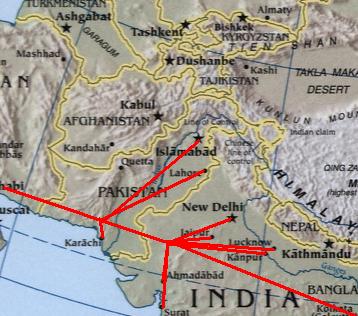TAPI or IPI? Just another story you're unlikely to run across in your usual news source.
This is only the latest chapter in what is a very long, dark and convoluted story that is as rocky and treacherous as the terrain these pipelines are meant to cross. But it should be known that
the 'pipelines issue' and the gas/oil they are meant to carry are still very much part of the impetus
for war, geo-politics, our national energy policy and of course private interests. Some things just don't change...
What Are The Prospects For Iran-Pakistan 'Pipeline Of Peace'? 
May 25, 2009
By Bruce Pannier
The signing of a 25-year deal under which Iran aims to export some 150 million cubic meters of gas to Pakistan per day has resurrected a moribund pipeline project known as the "Pipeline of Peace."
Not much has been heard about the Iran-Pakistan-India (IPI) pipeline for some time, but that all changed on the sidelines of a regional summit that brought together Iranian President Mahmud Ahmadinejad and Pakistani President Asif Ali Zardari in Tehran on May 24.
At a signing ceremony, the two leaders hailed the prospects of a pipeline that would start in the Iranian city of Asalouyeh, travel to Pakistan, and could eventually end in India.
But there are some major obstacles to overcome before any Iranian gas actually crosses the border into Pakistan -- and even more before that gas can be routed to India.
The first major question is where the money will come from.
The first leg of the plan is to build a 2,100-kilometer long pipeline from Iran's South Pars gas field into Pakistan -- at an estimated $7.5 billion. The next step would be to build a 600-kilometer extension that would go on to India.
But while a rival gas-pipeline project -- the
Turkmenistan-Afghanistan-Pakistan-India (TAPI) -- is supported by the Asian Development Bank, the IPI does not have any backing from international financial institutions. Furthermore, TAPI is not as vulnerable to the financial or political opposition that IPI could experience due to the involvement of Iran, whose nuclear program has made it a pariah in the international community.
Complicating matters for both projects is that they are to be routed through Baluchistan. Considering that Baluch nationalists have already blown up domestic gas pipelines on the Pakistani side of the border in their fight for greater autonomy from Islamabad, their stance on a new pipeline from Iran (or Afghanistan) could be easily guessed. ...cont'd
http://www.rferl.org/content/What_Are_The_Prospects_For_IranPakistan_Pipeline_Of_Peace/1739236.html-------------------------------------------------
Iran, Pakistan Sign Pipeline Deal (Asia Times)http://www.atimes.com/atimes/South_Asia/KE27Df03.html-------------------------------------------------
TAPI - Trans-Afghanistan PipelineThe Trans-Afghanistan Pipeline (TAP or TAPI) is a proposed natural gas pipeline being developed by the Asian Development Bank. The pipeline will transport Caspian Sea natural gas from Turkmenistan through Afghanistan into Pakistan and then to India. Proponents of the project see it as a modern continuation of the Silk Road. The Afghan government is expected to receive 8% of the project's revenue.
The 1,680 kilometres (1,040 mi) pipeline will run from the Dauletabad gas field to Afghanistan. From there TAPI will be constructed alongside the highway running from Herat to Kandahar, and then via Quetta and Multan in Pakistan. The final destination of the pipeline will be the Indian town of Fazilka, near the border between Pakistan and India. cont'd
http://en.wikipedia.org/wiki/Trans-Afghanistan_PipelineSome History:
------------------------------------------------
A Timeline of Oil and Violence (Afghanistan)
http://www.ringnebula.com/Oil/Timeline.htm------------------------------------------------
Afghanistan's Natural Resources:
http://www.rall.com/2004/06/trans-afghanistan-pipeline-project.html------------------------------------------------
U.S. Silk Road Policy
http://www.democraticunderground.com/discuss/duboard.php?az=show_topic&forum=115&topic_id=171417